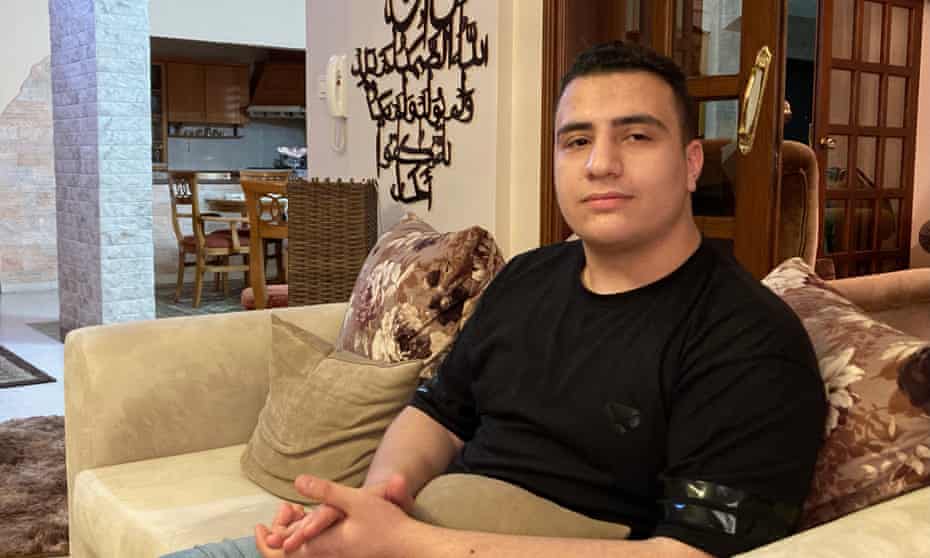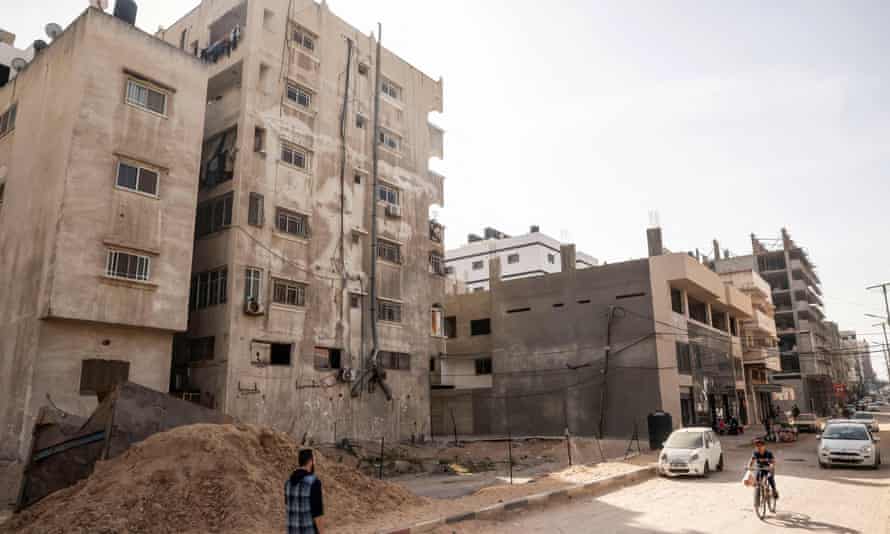
‘My only hobby is crying’: the boy who lost his family to an Israeli airstrike
Omar Abu al-Ouf’s father, mother, brother and sister were all killed in the attack on their apartment building last May
Bethan McKernan and Hazem Balousha in Gaza CityMon 16 May 2022 00.30 EDT
“It’s like he goes somewhere else,” said his grandmother, Manar, in the living room of the boy’s uncle’s house, where he now lives. “His whole family is gone, for nothing.”
Ouf spent 12 hours under the collapsed building, his arm around the body of his 12-year-old sister, Tala. His brother Tawfik, 17, remained alive for several hours; they talked to each other in the darkness, choking on rubble dust. Tawfik told him that their mother, Reem, was dead; before rescue teams could reach them, Tawfik too died from his injuries. Their father, Ayman, an internal medicine specialist at Gaza’s main hospital, was also killed in the attack.
The 11-day conflict last May between Israel and Hamas, the Palestinian militant group that controls the Gaza Strip, left Ouf totally alone. A year on, the teenager still suffers from nerve problems in his right arm and leg. He is trying to rebuild his life, he said, but still can’t make sense of what happened.
“Ramadan and Eid this year were very hard. I miss them every day. I didn’t think my life would be like this,” he said. “I don’t go out much. Sometimes my friends come see me here, but we have all got to study now. The only hobby I have since the incident is crying.”
Ouf is now living with his uncle’s family, not far from his old home on al-Wehda Street, a busy thoroughfare filled with apartment blocks, shops and cafes where 44 people were killed in the Israeli strike on 16 May last year. The attack was the single deadliest incident in the conflict, which left 256 Palestinians in Gaza and 14 people in Israel dead.
The Israel Defence Forces said the civilian deaths on Wedha Street were “unintended”, caused by the collapse of the underground foundations of a targeted Hamas military structure which brought down the housing blocks on the street above. Rights groups such as Amnesty International have said that the incident may constitute a war crime.

A year later, just 5% of the 1,000 housing units, roads and other infrastructure destroyed by the bombardment of the Gaza Strip have been rebuilt, according to the Hamas housing ministry.
Much UN and other funding from external donors is often held up in lengthy diplomatic talks or impeded by the Israeli and Egyptian authorities, which have blockaded the area since the Islamist group seized control in 2007. The de facto siege has led to a collapsed https://andrewtheprophet.comhealthcare system, poisoned Gaza’s water, and leaves the small area’s two million inhabitants struggling to cope with rolling power cuts.
The rubble from the last round of fighting may have been cleared, but gaping holes and sandy lots strewn with rubbish remain, a daily reminder of the lives and homes lost. On a poster hanging opposite Ouf’s destroyed home, the faces of three children killed in the last round of hostilities, in 2014, also peer down on passers-by.
Tensions between Hamas and Israel are on the rise again. The militant group’s leaders have praised a recent spate of terrorist attacks targeting Israelis that have left 19 people dead, and urged Palestinian citizens of Israel and those living in the occupied West Bank to carry out more attacks. Hamas has also threatened another all-out war if recent clashes at Jerusalem’s Aqsa mosque compound continue.
In response, Israeli officials have reportedly relayed a warning to Yahya Sinwar, Hamas’ top leader inside Gaza, that his latest speeches inciting terrorism give Israel the freedom to respond militarily.
Israel closed the only frontier crossing to most of the 12,000 Palestinians in Gaza with permission to work outside for two weeks, and Israeli media have reported that the government is considering restricting their numbers in future.
The loss of income has added to the daily misery in a place where a whole generation has now grown up trapped in the overcrowded, polluted coastal enclave: unemployment in Gaza is running at about 50%, and workers commuting to Israel are worried that they will no longer be able to bring home $1.5m in collective earnings each day.
Ouf, who has already lost everything, says he doesn’t care if there is another war. He hopes to leave Gaza one day – maybe to study abroad – but the future is too overwhelming to think about.
“It’s hard to express all the things I feel,” he said. “I was going to work hard, celebrate my exam results, go to university … I wanted to make my father proud of me. But instead, I am alone.”
No comments:
Post a Comment